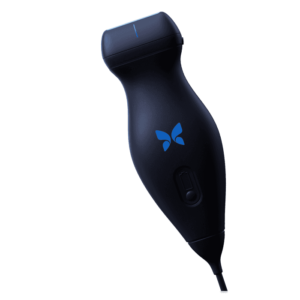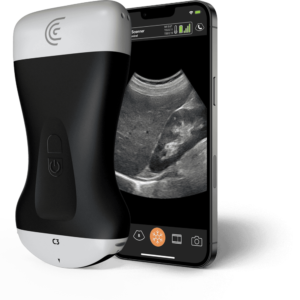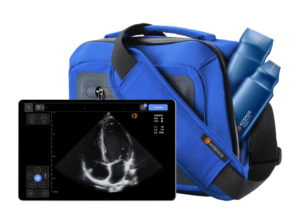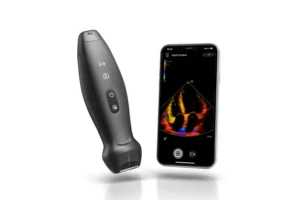Diagnostic imaging tools are essential in today’s fast-paced healthcare world. This is especially true as point-of-care ultrasound (POCUS) becomes more popular among healthcare workers.
Portable ultrasound devices let doctors and specialists perform necessary scans right at the patient’s side. They can use these devices in emergency rooms, primary care offices, or rural clinics. Handheld ultrasound devices, in particular, are transforming healthcare by making diagnostics more accessible, timely, and efficient.
Choosing handheld ultrasound devices for your medical practice can significantly impact patient care. Each device offers unique benefits for specialties like cardiology, OB/GYN, musculoskeletal imaging, and more.
In this guide, we’ll compare six handheld ultrasound devices for 2025. We’ll cover their features, pros, cons, pricing, and ideal use cases. By the end, you’ll be ready to decide on the best handheld ultrasound in 2025 option for your practice.
Benefits of a Portable Ultrasound Machine
Handheld ultrasound devices have reshaped healthcare delivery by providing essential imaging capabilities at the bedside. Here are some primary benefits of using these tools.
Portability and Convenience
Unlike traditional, bulky ultrasound machines, handheld ultrasound devices can be easily carried. These devices allow healthcare professionals to diagnose patients in various settings, including:
- Clinics
- Hospitals
- Ambulances
- Remote locations
Real-Time Diagnostic Capabilities
Portable ultrasound devices enable on-the-spot imaging, essential for quick decision-making, especially in emergency or critical care situations.
Versatility Across Specialties
Whether you work in emergency medicine, internal medicine, or OB/GYN, these devices offer imaging capabilities tailored to your needs and quickly adapt to various medical environments.
Enhanced Patient Outcomes
Faster diagnostics often lead to faster treatments, improving patient outcomes. Patients benefit from quicker and more accurate care.
Key Factors to Consider When Choosing a Handheld Ultrasound Device

Selecting the best portable ultrasound for clinicians requires careful consideration of multiple factors to ensure optimal functionality, quality, and cost-effectiveness. Here’s a breakdown of the most essential elements to look for.
Resolution and Image Quality
The level of image resolution is one of the most critical aspects of a handheld ultrasound device. It directly impacts diagnostic accuracy.
High-resolution imaging is essential for fields like cardiology, obstetrics, and gynecology. Clear images are needed for detailed checks of the heart, blood vessels, and fetal development.
Battery Life and Charging Options
Clinicians in busy places, such as emergency departments or intensive care units, need devices with long battery lives. Portable ultrasound devices with robust battery performance reduce the need for frequent recharging, ensuring consistent access to point-of-care ultrasound (POCUS) during long shifts.
Wireless vs. Wired Ultrasound Devices
Wireless ultrasound devices offer greater mobility and flexibility. This quality makes them ideal for bedside diagnostics and remote applications that require freedom of movement.
Wired ultrasound devices can offer more stable connections and reliable performance. This is important in critical situations where data transfer needs to be smooth and secure.
FDA-Cleared or CE-Marked Certifications
Safety and quality assurance rely heavily on regulatory standards. FDA-cleared or CE-marked devices indicate that they have undergone rigorous testing and comply with established healthcare standards. These certifications help ensure that portable ultrasound devices meet safety guidelines.
Cost-Effectiveness and Value for Money
Since many handheld ultrasound devices require a significant initial investment, assessing their cost-effectiveness is essential. Consider the purchase price and any ongoing expenses, such as:
- Software subscription fees
- Membership costs for accessing advanced features
Be sure to evaluate the total cost of ownership, including:
- Long-term maintenance
- Potential upgrades
Doing this will help determine the best balance between quality and affordability for your practice.
In-Depth Comparison of 6 Best Portable Ultrasound Devices
This section will compare handheld ultrasound devices that stand out in 2025. People recognize these devices for their advanced technology, ease of use, and effectiveness in medical applications. These devices are among the most recommended by healthcare professionals because of their:
- Versatility
- Portability
- Diagnostic reliability
1. Butterfly iQ+ by Butterfly Network Inc. ($1,588.00)
The Butterfly iQ+ has gained widespread recognition as a versatile, high-performance handheld ultrasound scanner. The design uses unique ultrasound-on-chip technology. This technology uses one probe to perform many types of imaging. This innovation makes it adaptable for diverse clinical needs across various specialties, including:
- Cardiology
- Emergency medicine
- Musculoskeletal care

Butterfly iQ+ is a handy all-in-one device that allows doctors to use fewer probes, reducing equipment costs.
Best Use Cases
The Butterfly iQ+ is highly recommended for primary care providers, emergency medicine, and internal medicine. It offers comprehensive imaging solutions, allowing practitioners to perform bedside diagnostics quickly. Its wide range of applications makes it ideal for family medicine and OB/GYN.
Pros
FDA-cleared for quality assurance, durable design, adaptability across various specialties, and a comprehensive software ecosystem. The software suite includes:
- Real-time collaboration options
- Customizable settings
- Cloud-based storage
Cons
The Butterfly iQ+ has many features but requires a subscription for advanced software options, which may raise the long-term cost. The subscription model may deter smaller clinics or practitioners on a tight budget.
Pricing and Value
The Butterfly iQ+ is positioned at the higher end of the handheld ultrasound market. It is a valuable investment for healthcare providers who need a multi-functional ultrasound device. Its incredible versatility and high image quality make it a doctor’s top choice. Doctors want to make diagnostics easier and improve patient care.
2. Clarius C3 HD3 by Clarius Mobile Health ($2,300.00)
The Clarius C3 HD3 has a sleek, lightweight design and offers high-definition imaging. It is a portable ultrasound machine for portability and diagnostic accuracy.
Designed to be user-friendly, the C3 HD3 provides medical professionals with reliable imaging capabilities without the bulk or complexity of traditional ultrasound systems. Its small and sturdy design and precise imaging make it an excellent choice for point-of-care and field use.
Best for
The C3 HD3 is well-suited for musculoskeletal imaging, emergency medicine, and general diagnostics. Its high-definition imaging features make it a valuable tool for doctors. They need clear images for detailed anatomical analysis, especially in these areas:
- Orthopedic
- Musculoskeletal
- General internal medicine
Pros
The wireless design offers ease of use and improved mobility. Its high-quality imaging and compact, durable design ensure it can withstand frequent use rigors. Its easy-to-use interface and customizable settings help create smooth workflows, making it accessible to many users.
Cons
Like the Butterfly iQ+, the C3 HD3 requires a subscription for premium features like cloud storage and advanced analytics. This may increase operational costs for smaller practices.
Pricing
The market prices of the Clarius C3 HD3 are in the mid-to-high range. An excellent choice for healthcare providers exists. They want portability and good image quality. Its high-definition imaging capabilities and versatile application make it a worthwhile investment for medical professionals focused on precise diagnostics and patient care efficiency.
3. Kosmos by EchoNous ($5,500.00)
The Kosmos by EchoNous represents one of the most advanced handheld ultrasound devices on the market. It combines high-performance imaging with artificial intelligence to elevate diagnostic precision.
The Kosmos is a robust handheld ultrasound comparison tool. It is intended for medical professionals who require comprehensive imaging, particularly in specialized areas.
Use Cases
The Kosmos shines in areas where high-level diagnostic imaging is needed, particularly in cardiology and complex medical imaging. It’s equipped to handle:
- Intricate cardiovascular assessments
- Abdominal imaging
- Obstetric scans
Its AI-powered guidance and TEE capabilities make it a preferred choice among:
- Cardiologists
- Intensivists
- Radiologists
Pros
The Kosmos offers AI-powered guidance, advanced cardiac imaging, and comprehensive scanning capabilities across multiple specialties. Its clear, high-definition imaging quality and automated features support streamlined workflow and accurate diagnostics.
Cons
Premium features and advanced technology are more expensive. Additionally, some users may require additional training in sophisticated AI technology.
Pricing
EchoNous prices the Kosmos higher because of its advanced features and diagnostic abilities. Although it may cost a lot, the device offers great features and AI integration, which makes it excellent value for doctors and specialists who value accurate and efficient diagnoses.
4. Mindray TE Air by Mindray ($2,499.00)
The Mindray TE Air is an innovative wireless handheld ultrasound scanner engineered for point-of-care applications. Its lightweight, compact design makes it exceptionally portable. Its advanced imaging technology and user-friendly interface also meet the diverse needs of medical professionals across various specialties.
The Mindray TE Air is perfect for clinicians who value mobility and ease of use. It has become one of the best portable ultrasound devices for emergency care and general diagnostics.
The TE Air provides color flow Doppler imaging. This helps doctors check blood flow and find vascular problems. This feature broadens the device’s applicability across various diagnostic scenarios, including:
- OB/GYN
- Musculoskeletal
- Cardiovascular
Ideal for
This device benefits emergency departments, OB/GYNs, and musculoskeletal imaging. It provides high-resolution images and is portable and easy to use.
The TE Air has a wireless design and a simple interface, making it a reliable choice for specialists and general practitioners who need quick access to diagnostic imaging in different clinical settings.
Pros
The TE Air is lightweight and wireless, combining excellent imaging and portability. It is ideal for clinicians who need a mobile ultrasound solution.
Its easy-to-use interface reduces the learning curve. This helps new users quickly add the device to their practice.
Cons
While TE Air performs well in basic diagnostics, it may lack some advanced features in higher-end models like the Kosmos. Clinicians who need specialized features, like AI-assisted measurements or advanced cardiac imaging, may discover that TE Air needs to be improved.
Pricing and Value
The Mindray TE Air is in the mid-range price category. It provides excellent value for medical professionals.
This handheld ultrasound scanner is reliable and easy to use. Its portability, high-resolution imaging, and versatility make it an intelligent choice for clinics and hospitals. This device helps improve point-of-care diagnostics without a significant financial investment.
5. GE Vscan Air SL by General Electric ($2,555.00)
The Vscan Air series by General Electric (GE) is designed to offer exceptional flexibility. It caters to the varied demands of medical professionals in fields such as:
- Internal medicine
- OB/GYN
- Emergency care
This series includes the SL and GE Vscan CL models, each optimized to support specific imaging needs across specialties. Its innovative dual-probe functionality is advantageous for clinicians who require multiple imaging modes within a single device.
Key Features
The Vscan Air SL and CL have a dual-probe design, which combines linear and curved transducers in a small, handheld device. The setup offers a wide range of diagnostic tools, including imaging of blood vessels and soft tissues, scans of the abdomen, and pregnancy scans.
The dual-probe flexibility enables practitioners to switch between imaging modes without needing multiple devices. Its wireless technology lets clinicians capture and review images on a compatible smart device, making it great for point-of-care and remote settings.
Applications
The Vscan Air series is versatile enough to support various medical applications. Well-suited for internal medicine assessments, this enables physicians to evaluate:
- Soft tissues
- Organs
- Vascular structures
In OB/GYN, dual-probe technology allows for imaging at different depths, aiding in prenatal evaluations and regular gynecological exams. Emergency care providers also benefit from the rapid imaging capabilities for trauma assessments, making it a valuable tool for triaging and immediate diagnostics.
Pros
The dual-probe flexibility means clinicians do not need to carry many probes. They can easily switch between linear and curved imaging modes. The wireless design enhances portability and reduces clutter. GE’s reputation for reliable imaging quality also ensures high-fidelity images across applications.
Cons
The higher initial cost may be a consideration, especially for smaller clinics or solo practitioners. While the dual-probe technology is convenient, it has a premium price tag. It may also require compatible software for optimal integration with healthcare systems.
Pricing
The Vscan Air SL and CL have higher prices, but they provide great value. They have dual-probe features and wireless capabilities. Medical practices that prioritize portable ultrasound for clinicians across multiple specialties justify the pricing with the device’s versatility and performance.
6. Lumify by Philips Healthcare ($4,444.00)
The Philips Lumify stands out for its compatibility with various smart devices. It transforms common smartphones and tablets into advanced portable ultrasound systems. This new method lets healthcare providers use a handheld ultrasound scanner, which is lightweight and easy to add to daily practice.
The Lumify offers flexibility for providers in:
- Remote medicine
- Telemedicine
- In-field diagnostics
Lumify is a top choice for mobile healthcare providers. Top Reasons to Invest in a Philips Portable Ultrasound for Your Practice
Best Use Cases
The Philips Lumify is perfect for primary care. Healthcare providers need a reliable diagnostic tool for their busy practices. It helps them manage many patient consultations.
It is also great for remote medicine and mobile diagnostics. Its real-time sharing features and smart device compatibility make it a good choice for doctors, especially those working in remote areas or conducting telemedicine appointments.
In places like home healthcare and mobile clinics, Lumify is easy to use and portable. This makes it valuable for providers who care for patients outside regular medical facilities.
Pros
Lumify’s versatile device compatibility allows healthcare professionals to connect it to many available smart devices. It provides a user-friendly and adaptable ultrasound solution.
Its real-time image sharing enables remote collaboration, making it ideal for telemedicine and in-field diagnostics. Additionally, excellent imaging quality supports accurate diagnoses.
Cons
You need a compatible smart device to use Lumify, which could increase initial setup costs for those needing a new phone or tablet.
Relying on an external device can limit its use in places where healthcare providers need a complete solution. They often prefer to use less equipment.
Pricing and Value
The Philips Lumify is reasonably priced. It provides excellent value for those who need mobility and flexibility in point-of-care ultrasound. It also supports real-time collaboration. Its versatile connectivity options make it a worthwhile investment for mobile healthcare providers and telemedicine users.
Conclusion: Find the Best Handheld Ultrasound Devices for Your Practice
You can choose the suitable handheld ultrasound device based on your practice’s unique requirements and the types of diagnostics needed. Each of the six handheld ultrasound devices reviewed here offers specific features and strengths tailored to various medical fields.
At Marcroft Medical, we provide many wireless handheld ultrasounds. These devices are for healthcare professionals who need reliability and innovation. Check out our range of high-quality handheld ultrasound scanners. Find the correct device to improve your medical practice’s diagnostic abilities.








